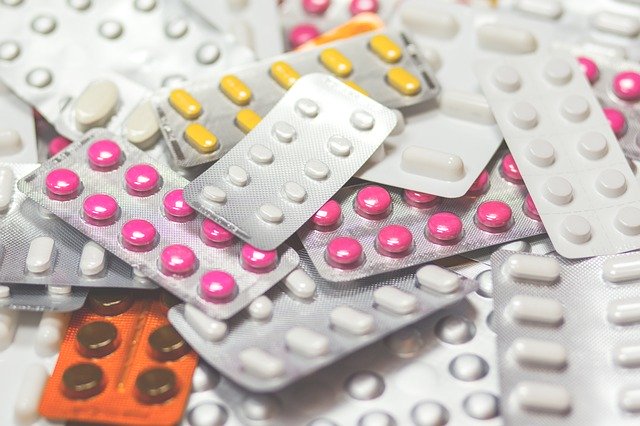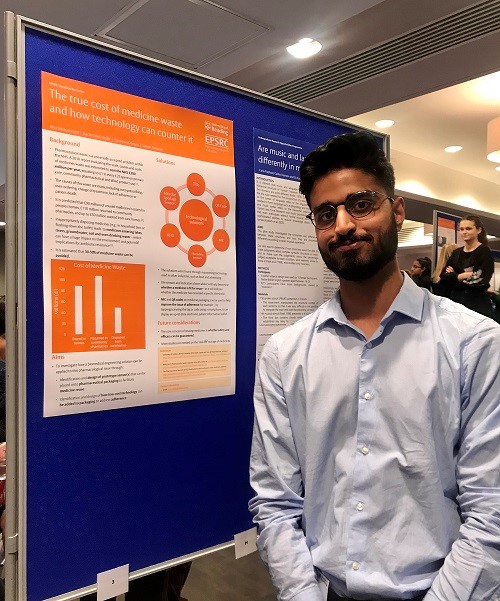Parliamentarians will hear today about the problem of medicines waste – and how better pharmaceutical packaging could help save the NHS money – from pharmacy student Bilal Mohammed, who is one of two winners of our undergraduate research scheme. He told us more.

Each year, we throw away or destroy millions of unused medicines at a cost to the NHS of £300m in England alone. Unused medicines worth £110 million end up in the incinerator each year after being returned by patients to community pharmacies. But what if we are missing a trick and these medicines could be safely re-used?
The cost savings to the NHS could be significant, not to mention the reduced environmental impact; currently, medicines can enter soil, lakes, rivers and even drinking water after being flushed down the toilet or dumped in household bins.
Undergraduate MPharm student Bilal Mohammed witnessed the problem of medicines waste first-hand while on a placement at a local pharmacy. So he was enthusiastic about carrying out real-world research last summer to investigate how these issues could be solved as part of our Undergraduate Research Opportunities Programme (UROP) – a scheme that gives students the opportunity to gain real research experience, working with academics.
Smarter packaging

Over his 10-week placement, Bilal was tasked with designing improved pharmaceutical packaging. He was supported by an Engineering and Physical Sciences Research Council Vacation Bursary and worked under the supervision of Professors Rachel McCrindle and Simon Sherratt in Biomedical Engineering and Professor Parastou Donyai in Pharmacy.
The overall aim was to see if this could encourage medicine reuse and also to help more patients to take their medicines correctly in the first place.
“Drugs can stop working if exposed to extreme temperatures, humidity and microbial contamination. If medicines are to be re-used it is critical that they are still safe and effective for the next patient,” says Bilal, who investigated different technologies to packaging to show that medicines would be safe for re-use.
“I looked at the food industry and created prototypes of some temperature and humidity sensors that can be placed in medicine packaging,” he adds.
Results showed that temperature sensors and microbe spoilage sensors used in the food industry could be a feasible method to show whether a medicine has exceeded a specific heat or bacterial contamination threshold.
The study also showed that NFC (Near Field Communication) and QR codes could be an easy and effective way to show patients how to take their medicines correctly. By tapping or scanning codes on the packaging with a smartphone, an up-to-date patient information leaflet appears on the screen.
Bilal won the prize for the best UROP research project in the Health Research theme at last year’s UROP Showcase event for his research. He was also named as one of two overall UROP winners who will get the chance to present their work at the annual Posters in Parliament event at the House of Commons, which takes place today.
Independent research
Bilal would recommend the UROP scheme to any undergraduates wanting to flex their research muscles.
He says: “UROP is a very competitive research programme and I am really happy to get through. Working on the project was the best use of my time during summer. I got to learn something new and even got paid for it!”
“Working on the project gave me a head start to build the right independent research skills. Whether it is carrying out a systematic literature review, data collection or a comparative study, I now have a thorough understanding of each aspect of research. The skills I have learnt are proving helpful with my dissertation as well,” Bilal comments.
His Reading academic supervisors treated him like part of the team and he describes them as “warm and welcoming”.
“I always felt my opinion was valued and they gave me enough room to share my research findings and ideas. I even had the opportunity to share an office with other PhD students who gave me advice on best practices in research,” he says.
The research team have submitted a paper to a journal that encompasses the UROP work, on which Bilal is a named author. Bilal is now looking forward to doing a pre-registration year working in a hospital pharmacy. And after that, inspired by working with academics on a real research project, he plans to go on to do a PhD in drug delivery.
One of Bilal’s UROP supervisors, Professor Parastou Donyai, has previously blogged for Connecting Research on medicine waste.
Reading’s Undergraduate Research Opportunities Programme (UROP) gives students the opportunity to gain real research experience with an academic at the university. Each 10-week project has been specially designed to provide a genuine insight into the research environment and can make a significant contribution to an undergraduate’s transferable skills and employability. The deadline for students to apply for one of this summer’s projects is 3 April 2020. See available placements for 2020.
The deadline to make proposals for staff who are interested in running a UROP placement is in December each year. Those projects selected for funding are then advertised via the placements page in the Spring term. You can find out more on our website.
